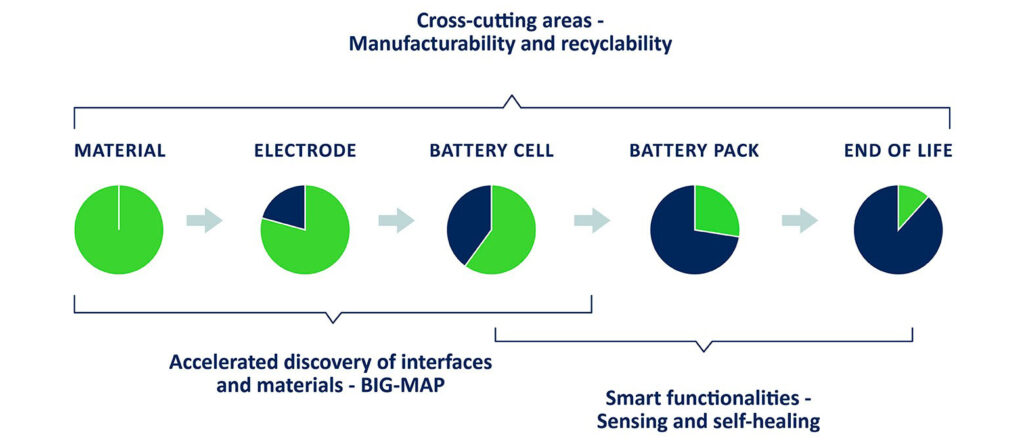Impact of a large-scale battery research initiative
The transition towards a carbon neutral society, reducing net greenhouse gas emissions by at least 55 percent by 2030, is the goal of the European commission. It requires batteries with ultra-high performance beyond today capabilities. Energy and power density must approach theoretical limits, and outstanding lifetime and reliability as well as enhanced safety and environmental sustainability must be achieved.
Batteries are a key enabler to increase energy security, reduce the environmental footprint in different areas, and help forge a climate-neutral society while creating new markets and jobs. BATTERY 2030+ will lay a scientific and technological foundation to enable the next generation of high-performance, safe, and sustainable batteries in Europe. These novel battery technologies will have a societal and an environmental impact on many levels.
The collaborative approach of Battery 2030+ creates strong synergies for Europe. By an integrated large-scale approach our resources will be to their best use and accelerate new innovations. A large-scale initiative is also needed to attract the talent and competencies necessary to achieve the technical goals and to support the European industry with a skilled workforce. Educational and outreach programmes are therefore an essential part of the initiative.
To ensure EU competitiveness in the global battery sector in a strategic and cost‐effective manner a holistic approach covering different aspects is needed. By close interactions with, and support from, other European initiatives, industry stakeholders, and networks that either is or will be part of BATTERY 2030+, the research can quickly transform to higher TRL-levels and be applied in industry and society and thus enhance European competitiveness.
Impact along the battery value chain
Important parameters to address are the impact of scaling on energy density, that is the reduction in weight- and volume-specific metrics when scaling up to the battery pack level. We will also address the unwanted chemical and electrochemical side reactions that reduce battery capacity over time. Furthermore, to be commercially successful cross-cutting areas within manufacturing must be considered and make sure the batteries support scalability and are fit for recycling.
The themes and research areas of BATTERY 2030+ will address these issues as shown in this figure.

Impact on the European SET-Plan targets for batteries
The SET-Plan, (Strategic Energy Technology) Action 7 concentrates on batteries, mainly for the transport sector. The intent is to “Become competitive in the global battery sector to drive e‐mobility forward”.
The BATTERY 2030+ initiative however also addresses the great need for efficient and sustainable batteries in other areas. Our approach with three themes and six research areas will have a positive impact on the development of batteries for a wide range of applications, including transport electrification, stationary storage enabling renewable energy use in the electricity grid, and new emerging possibilities and applications. The new knowledge generated will likewise be transferred to new educational curricula at various levels.
